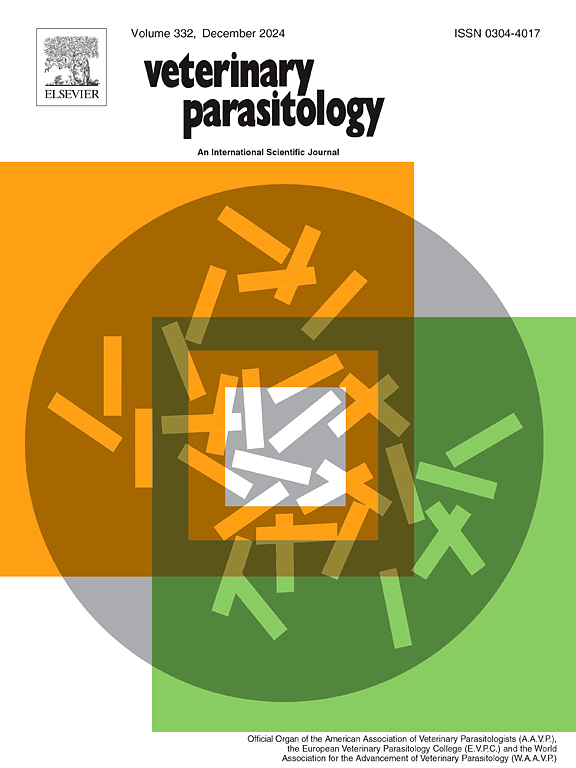利用商业血清学检测绵羊血吸虫病
IF 2.2
2区 农林科学
Q2 PARASITOLOGY
引用次数: 0
摘要
人类血吸虫病是一种人畜共患疾病,这意味着野生动物或牲畜可作为该疾病的宿主。这使得寄生虫在正在开展广泛治疗行动的地区继续活跃传播,可能破坏抗击血吸虫病的努力。在多宿主和多寄生虫系统中,实现疾病消除需要纳入所有宿主。因此,动物诊断对于精确靶向治疗至关重要。然而,诊断动物的方法仍然不发达。我们评估了两种市售的血清学诊断试剂盒,即Bordier Affinity Products公司生产的血吸虫IgG ELISA试剂盒和LDBIO diagnostics公司生产的血吸虫II型Western Blot IgG试剂盒,这两种试剂盒通常用于人类诊断。对35只羊的175份血清样本进行了诊断,这些羊实验感染了血葡萄球菌、牛葡萄球菌以及这两种物种交配产生的各种菌株。这些样品的诊断是可能的,使用两种方法进行测试,通过更换共轭物来适应这两种方法的协议。kappa系数突出了每种新测试方法与动物尸检期间成虫恢复之间的实质性一致性,表明两种血清学诊断方法获得的结果具有很强的一致性。在这两种情况下,需要进一步的研究来验证和标准化,以促进现场应用,并明确Western-Blot的特异性。本文章由计算机程序翻译,如有差异,请以英文原文为准。
Use of commercial serological tests to detect schistosomiasis in sheep
Human schistosomiasis is a zoonotic disease, meaning that wild animals or livestock can serve as reservoirs for the disease. This sustains active parasite transmission in regions where extensive treatment initiatives are underway, potentially undermining efforts to combat schistosomiasis. In multi-host and multi-parasite systems, achieving disease elimination necessitates the incorporation of all reservoir hosts. For this reason, animal diagnosis is crucial to enable accurate targeting of treatment. However, methods for diagnosing animals remain underdeveloped. We have evaluated two commercially available serological diagnostics, the Schistosoma IgG ELISA produced by Bordier Affinity Products, and the Schisto II Western Blot IgG kit produced by LDBIO Diagnostics which are commonly employed for human diagnosis. The diagnostics were carried out on a collection of 175 sheep serum samples from 35 sheep experimentally infected with S. haematobium, S. bovis and various strains resulting from mate crossing between these two species. The diagnosis of these samples was possible using the two methods tested, with an adaptation of the protocol of both methods by replacing the conjugate. The kappa coefficient highlights substantial agreement between each newly tested method and the adult worm recovery during animal necropsy, suggesting robust consistency in the results obtained with the two serological diagnostics. In both instances, further studies are required for validation and standardization to facilitate field application and to specify the specificity of the Western-Blot.
求助全文
通过发布文献求助,成功后即可免费获取论文全文。
去求助
来源期刊

Veterinary parasitology
农林科学-寄生虫学
CiteScore
5.30
自引率
7.70%
发文量
126
审稿时长
36 days
期刊介绍:
The journal Veterinary Parasitology has an open access mirror journal,Veterinary Parasitology: X, sharing the same aims and scope, editorial team, submission system and rigorous peer review.
This journal is concerned with those aspects of helminthology, protozoology and entomology which are of interest to animal health investigators, veterinary practitioners and others with a special interest in parasitology. Papers of the highest quality dealing with all aspects of disease prevention, pathology, treatment, epidemiology, and control of parasites in all domesticated animals, fall within the scope of the journal. Papers of geographically limited (local) interest which are not of interest to an international audience will not be accepted. Authors who submit papers based on local data will need to indicate why their paper is relevant to a broader readership.
Parasitological studies on laboratory animals fall within the scope of the journal only if they provide a reasonably close model of a disease of domestic animals. Additionally the journal will consider papers relating to wildlife species where they may act as disease reservoirs to domestic animals, or as a zoonotic reservoir. Case studies considered to be unique or of specific interest to the journal, will also be considered on occasions at the Editors'' discretion. Papers dealing exclusively with the taxonomy of parasites do not fall within the scope of the journal.
 求助内容:
求助内容: 应助结果提醒方式:
应助结果提醒方式:


